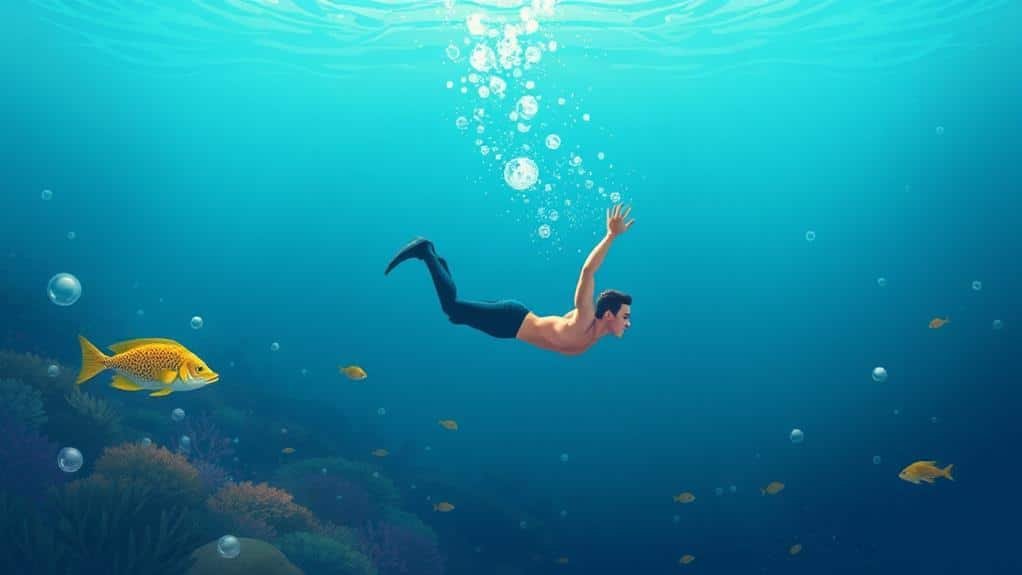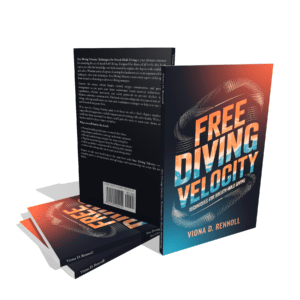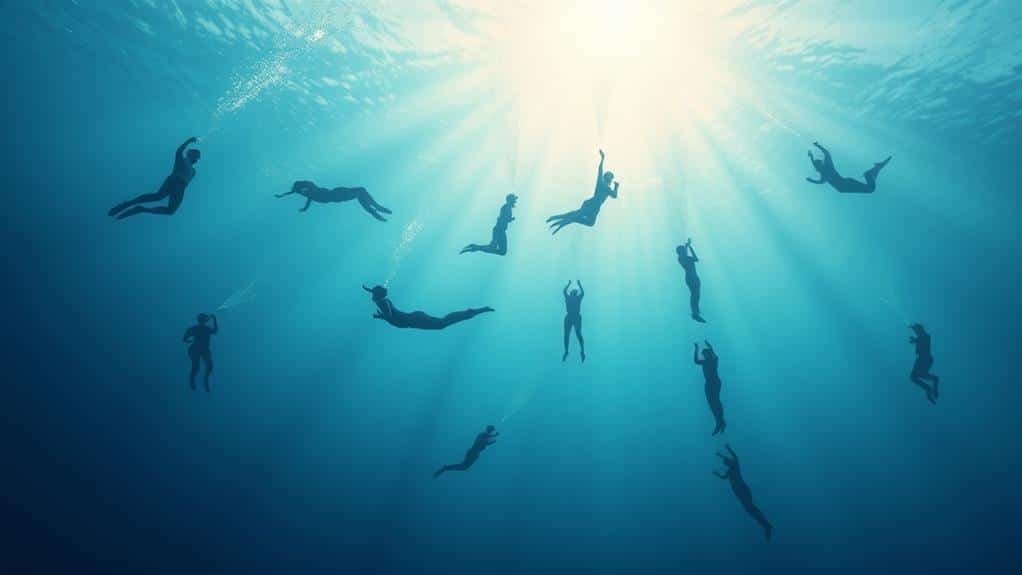When you think about free diving, it’s easy to overlook the importance of technique in achieving ideal velocity. You might assume that simply holding your breath is enough, but there’s so much more at play. By mastering specific breathing exercises and movement strategies, you can enhance your performance underwater. You’ll discover how equalization techniques and mental conditioning not only improve your dive efficiency but also deepen your connection with the ocean. Curious about how to implement these strategies effectively? There’s more to explore that could transform your diving experience.
Key Takeaways
- Effective breath control techniques significantly enhance dive duration, allowing divers to maintain velocity and efficiency underwater.
- Streamlined movements and efficient finning reduce drag, conserving oxygen and improving overall diving speed.
- Proven breathing exercises can optimize lung capacity, directly impacting breath-hold performance and velocity during dives.
- Mastering equalization techniques prevents discomfort at depth, enabling divers to focus on speed and movement without distractions.
- Mental conditioning helps divers manage anxiety and maintain focus, which is crucial for achieving optimal performance and velocity while breath-hold diving.
Introduction

Free diving’s allure lies in its unique blend of physical skill and mental acuity, drawing divers into the depths of the ocean where they can experience tranquility and adventure simultaneously.
At the core of this exhilarating sport is breath control, essential for extending your dive duration and conserving oxygen.
Mastering effective equalization techniques is equally important, allowing you to manage pressure changes as you descend. You’ll learn to equalize your ears and sinuses, ensuring a safe and comfortable experience underwater.
As you refine these skills, you’ll discover the harmony between body and mind, enhancing your connection with the ocean.
This introduction sets the stage for deeper exploration into techniques that elevate your free diving journey to new heights.
Book Overview

As you commence your free diving journey, this all-encompassing book serves as your crucial guide, encompassing everything from fundamental techniques to advanced skills.
You’ll investigate effective breath control methods that help you maximize your dive duration and optimize oxygen use.
The book highlights the significance of mental conditioning, teaching you how to manage fear and anxiety while underwater.
You’ll explore strategies to improve your focus and calmness, allowing for a more enjoyable diving experience.
Additionally, it covers essential techniques for equalization and streamlining your movements, ensuring you dive efficiently and safely.
CLICK HERE TO REACH YOUR COPY NOW
What You Will Find in This Book

Within the pages of this book, you’ll discover a wealth of knowledge designed to elevate your free diving skills, whether you’re a novice or an experienced diver.
You’ll dive deep into essential dive techniques that focus on breath control, helping you extend your underwater durations and enhance your overall performance.
Each chapter covers proven breathing exercises to optimize lung capacity, as well as effective equalization methods for managing pressure at depth.
You’ll also learn about streamlined movements and efficient finning techniques that conserve oxygen.
By mastering these skills, you’ll not only improve your physical capabilities but also build the mental discipline needed for successful dives.
Get ready to transform your diving experience and connect with the underwater world like never before.
In-Depth Analysis
Exploring the intricacies of free diving reveals a rich tapestry of techniques and principles that not only enhance performance but also deepen your connection with the underwater domain.
Mastering breath control and oxygen conservation is essential for extending your dive durations. You’ll also need effective equalization techniques to manage pressure as you descend.
Mental preparation plays a significant role, helping you navigate the physiological response to breath-holding and pressure changes.
Engaging with the community fosters shared experiences and provides valuable insights into safety protocols, ensuring you and your dive buddy stay protected.
Why You Should Have This Book

Having this book on free diving is vital for anyone enthusiastic to master the art of breath-hold diving. It offers an in-depth exploration of the benefits of free diving, equipping you with techniques that enhance your underwater skills.
You’ll learn proven methods for breath control, oxygen conservation, and efficient movement, which are essential for successful dives. The book emphasizes the importance of safety and mental discipline, helping you foster a calm mindset important for overcoming challenges underwater.
Reviews and Testimonials
Numerous free divers have shared their transformative experiences after using this book, highlighting its impact on their diving practices.
Many report significant improvements in their breath control and dive times, thanks to the targeted techniques outlined within. Diver experiences frequently mention how the training feedback offered helps refine their skills, making them feel more confident and prepared underwater.
From mastering equalization to enhancing mental discipline, readers appreciate the thorough approach that caters to all levels. Testimonials emphasize not just physical gains, but also the psychological benefits of feeling calm and focused during dives.
This book has become an essential resource, enabling divers to push their limits while prioritizing safety and efficiency in their underwater adventures.
Practical Applications

Practical applications of free diving techniques extend beyond the depths of the ocean, impacting your overall fitness and mental well-being.
By mastering breath control, you enhance not just your diving performance but also your daily life activities. Improved lung capacity and oxygen utilization can boost your endurance in various physical pursuits, from running to swimming.
Additionally, the mental discipline you cultivate through free diving helps you manage stress and anxiety, leading to better focus and clarity. This performance enhancement translates into improved cognitive function, allowing you to tackle challenges both underwater and on land.
Embracing these techniques can transform not only your diving experience but also your approach to fitness and mental resilience in everyday situations.
Conclusion and Recommendation
Mastering free diving techniques not only elevates your underwater experience but also enhances your overall fitness and mental resilience.
To maximize your performance, focus on developing your breath control through consistent practice of proven techniques. Incorporate safety practices into every dive; always dive with a buddy, establish clear communication, and respect your limits to prevent accidents like hypoxia.
It’s crucial to monitor your buddy’s well-being and practice recovery protocols diligently. Additionally, invest time in mental conditioning and visualization to overcome anxiety and improve your focus underwater.
Embrace the challenge of refining your skills, as this will deepen your connection with the ocean and foster a sense of achievement.
Dive responsibly, and enjoy the journey of free diving!
CLICK HERE TO REACH YOUR COPY NOW
Frequently Asked Questions
What Gear Do I Need for Free Diving?
“You can’t make an omelet without breaking a few eggs.”
To plunge into free diving, you’ll need essential gear. Start with a well-fitting mask for clear vision and comfort.
Next, choose the right fin types; long, flexible fins enhance your propulsion and efficiency underwater.
Don’t forget a wetsuit for thermal protection, and consider a snorkel for surface breathing.
This gear will help you maximize your experience while ensuring safety and performance in the depths.
How Do I Choose a Dive Buddy?
Choosing a dive buddy is vital for your safety and enjoyment. Look for dive compatibility, ensuring your buddy shares similar skill levels and comfort in the water.
Familiarize yourselves with safety protocols, like monitoring each other during dives and practicing emergency procedures. Communication is key; discuss dive plans and boundaries beforehand.
A good buddy enhances your experience, helping you feel more secure while exploring underwater wonders together. Trust and teamwork are essential for safe diving.
What Should I Eat Before a Dive?
Before a dive, focus on pre-dive nutrition to enhance your performance. Eat a balanced meal rich in complex carbohydrates and protein about two to three hours beforehand to fuel your energy levels.
Hydration strategies are equally important; drink water or electrolyte-rich fluids to maintain ideal hydration. Avoid heavy meals and caffeine, as they can cause discomfort.
How Can I Prevent Ear Pain While Diving?
To prevent ear pain while diving, you need to master ear equalization techniques.
As you descend, regularly pinch your nose and gently blow to equalize the pressure in your ears. This pressure management is essential; waiting too long can lead to discomfort or injury.
Stay relaxed and descend slowly, giving your body time to adjust.
Practicing these techniques beforehand will enhance your comfort and safety underwater, so you can enjoy your dive without pain.
Are There Age Restrictions for Free Diving?
There aren’t strict age restrictions for free diving, but training techniques and safety protocols are vital for all ages.
Younger divers should have parental guidance and proper training to guarantee they understand their limits and the risks involved.
It’s important to foster a safe environment where you can learn effective breath control and equalization methods, allowing you to enjoy the sport responsibly while minimizing the chance of accidents and enhancing your diving experience.
CLICK HERE TO REACH YOUR COPY NOW
IF YOU LOVED THIS BOOK, CHECK OUT THIS OTHER MUST-READ!

